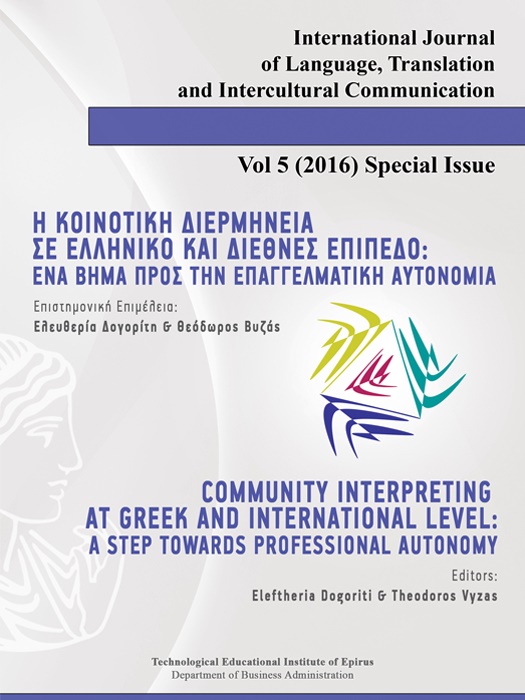Current (2015) Professional Profiles of the Legal Translator in Greece: A Function-oriented Comparison
Abstract
Like translation in general, and even law itself, legal translation is an interdisciplinary field. Legal linguistics (jurilinguistics), comparative law, general law, terminology, text-linguistics and pragmatics, all have a share in legal translation. The latter is generally viewed as a sort of technical translation (Venuti 1995: 41) and legal language as a technical language (Cao 1997: 18). Those who argue for its special status often claim that legal translation is the antipode of technical translation (Bocquet 2000: 16). On the other hand, there are scholars who argue against this special status of legal translation, claiming there is nothing special about legal translation (Harvey 2002: 180). More moderate views are also found (Herbots 1987: 814). In such questions it takes no true/false answer. Rather, there are many sorts of legal translation. Of course, each view has different implications as far as the legal translator’s skills are concerned. Our discussion starts with a presentation of some key-views about legal translation, with particular emphasis on opposing ones. Then we present the main professional profiles of the legal translator in Greece and the relevant legislation. Who does translate legal texts? What skills do they have? How do they describe their profession and/or services in social media and/or professional websites? Who is the ideal legal translator for the several categories of clients? Which is the right kind of education and/or training for every sort of legal translator? Those are some of the questions that this article tries to give an answer to. After presenting the main functions of translated legal texts, the article closes with a comparison of legal translator’s professional profiles in Greece on the basis of those text functions.
Article Details
- How to Cite
-
Krimpas, P. G. (2015). Current (2015) Professional Profiles of the Legal Translator in Greece: A Function-oriented Comparison. International Journal of Language, Translation and Intercultural Communication, 3, 20–39. https://doi.org/10.12681/ijltic.8713
- Issue
- Vol. 3 (2015)
- Section
- Articles

This work is licensed under a Creative Commons Attribution-NonCommercial-ShareAlike 4.0 International License.
Copyright Notice
Authors who publish with this journal agree to the following terms:
- Authors retain copyright and grant the journal right of first publication with the work simultaneously licensed under a Creative Commons Attribution License that allows others to share the work with an acknowledgement of the work's authorship and initial publication in this journal.
- Authors are able to enter into separate, additional contractual arrangements for the non-exclusive distribution of the journal's published version of the work (e.g., post it to an institutional repository or publish it in a book), with an acknowledgement of its initial publication in this journal.
- Authors are permitted and encouraged to post their work online (e.g., in institutional repositories or on their website) prior to and during the submission process, as it can lead to productive exchanges, as well as earlier and greater citation of published work (See The Effect of Open Access).




